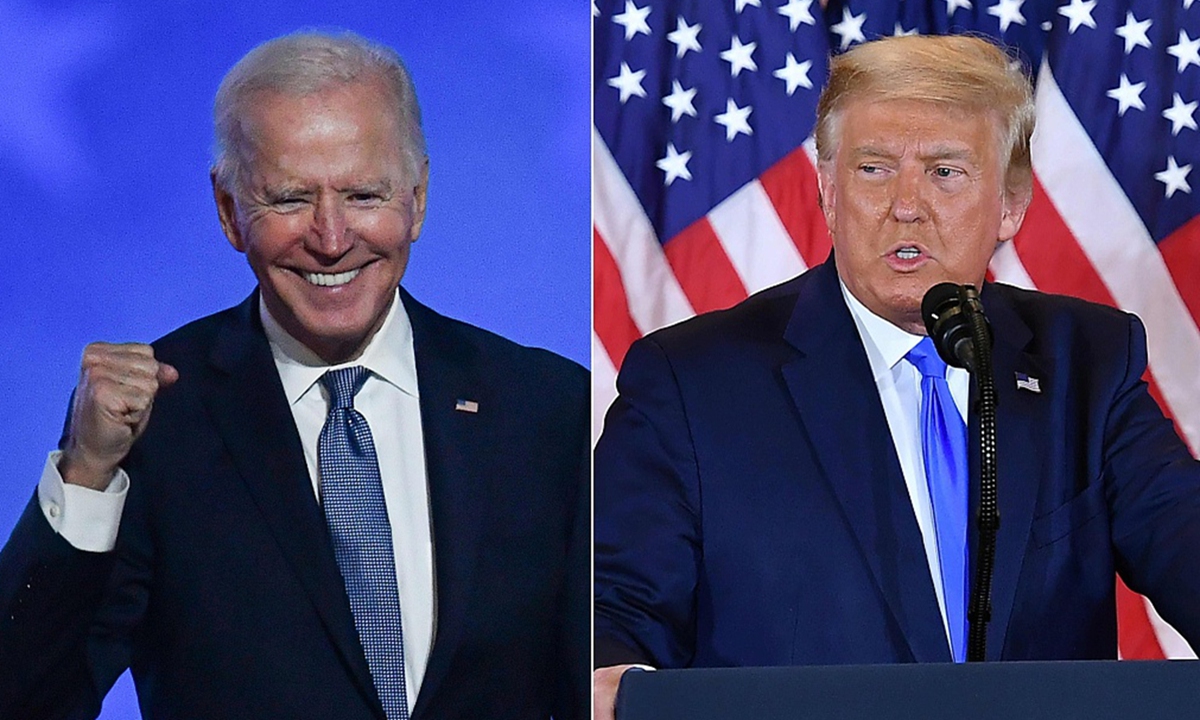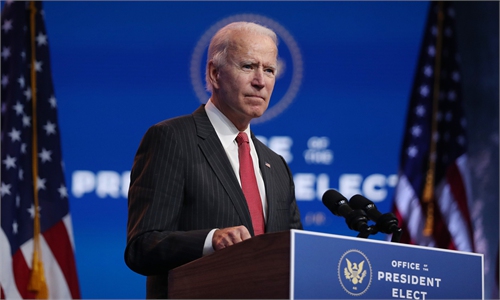
Biden Trump Photo:VCG
The US General Services Administration office informed US president-elect Joe Biden on Monday that the administration of US incumbent President Donald Trump is ready to begin the formal transition process with the official funds unleashed. The US is now ushering the Biden era. The president-elect is expected to remarkably adjust policies of the Trump administration, especially in diplomacy.
US former defense secretary Jim Mattis said in an article published on Monday in Foreign Affairs magazine that he hopes Biden will take "America First" out of the national security strategy with the incoming administration.
Washington has spared no effort to maintain its global hegemony as well as its national interests since the end of the Cold War, but different presidents tend to adopt diverse approaches to achieve this goal. Trump's narratives and moves tended to be more direct, such as proposing "America First," withdrawing from international organizations or agreements, and launching trade wars.
Former president Barack Obama said in a 2014 graduation speech at West Point that the US "must always lead on the world stage." This signals his administration also aims to maintain US hegemony. In essence, what Obama pursued in his term was also a kind of "America First," but with different rhetorical flair and methods.
When it comes to Biden, he may believe the way to maintain US hegemony is to restore US' leadership role in the world, underlining the significance of soft power, democratic values, and alliances.
After taking office, Biden will improve US' ties with its allies. Trump believes US allies are freeloaders, taking advantage of the US. Biden by contrast believes the US can best maintain hegemony by appropriately using alliances. After a call on Monday with Ursula von der Leyen, head of the European Commission, Biden's office said in a statement that he "underscored his commitment to deepen and revitalize the US-EU relationship." Furthermore, the QUAD (an informal strategic forum between the US, Japan, Australia and India) will be strengthened, and its alliances with Japan and South Korea will also be deepened.
Global multilateral governance will also witness changes. Under Biden presidency, Washington is expected to return to the WHO, and the Paris Agreement, and consider rejoining the Iran nuclear deal. However, Biden will not totally repudiate Trump's policies. Democrats also believe that some of them are effective. Therefore, Biden may select to sustain a few of them but with greater rhetorical finesse and execution oversight.
Since the end of the Cold War, Washington has gradually shifted its focus from Europe to the Asia-Pacific region. Yet the Middle East grabbed much US attention following the 9/11 attacks during the administration of former president George W. Bush. From Obama's rebalance to the Asia-Pacific to Trump's Indo-Pacific Strategy, the US' focus has shifted to this region with greater energy. Biden is supposed to continue this trend. After all, the international community remains on the same page to some extent in this point: The 21st century belongs to Asia. And the US' most important rival, China, lies in this region and holds great regional and global sway.
There will be no fundamental reversal in China-US relations in this sense: The incoming Biden administration will also see China as a strategic rival. But there will be more room for cooperation in comparison to the Trump era.
Owing to the Trump administration, bilateral ties have hit the lowest for the past four decades. Even a slight relaxation is of significance to both countries. The two countries may engage in more collaboration in the global battle against the COVID-19 pandemic, vaccine distribution, global macroeconomic policy coordination, as well as climate change.
In addition, Biden will discard some of Trump's irrational policies regarding China. For example, in terms of people-to-people exchanges, his administration may reconsider to reopen the closed Chinese consulate in Houston.
However, Biden will follow some of Trump's approaches, which they feel have turned out to be effective in dealing with China, rather than merely returning to an Obama era style of engagement.
Although Trump failed to win this presidential election, he received over 72 million votes. The severe polarization will pose considerable challenge for Biden to get rid of Trump's legacy. Even though Biden won, the rancor of domestic anti-globalization voices and populism are still alive in the US. Their influence will be revealed in the next midterm election in 2022 and presidential election in 2024. Republican forces remain robust in the Congress. Against this backdrop, when making policies, Biden has to carefully consider hard-line Republicans' opinions. He is likely to make some compromises with them, especially on the China agenda. Therefore, it will be difficult for Biden to significantly improve relations with China.
The author is a research fellow with the Institute of America Studies, China Institutes of Contemporary International Relations. opinion@globaltimes.com.cn

